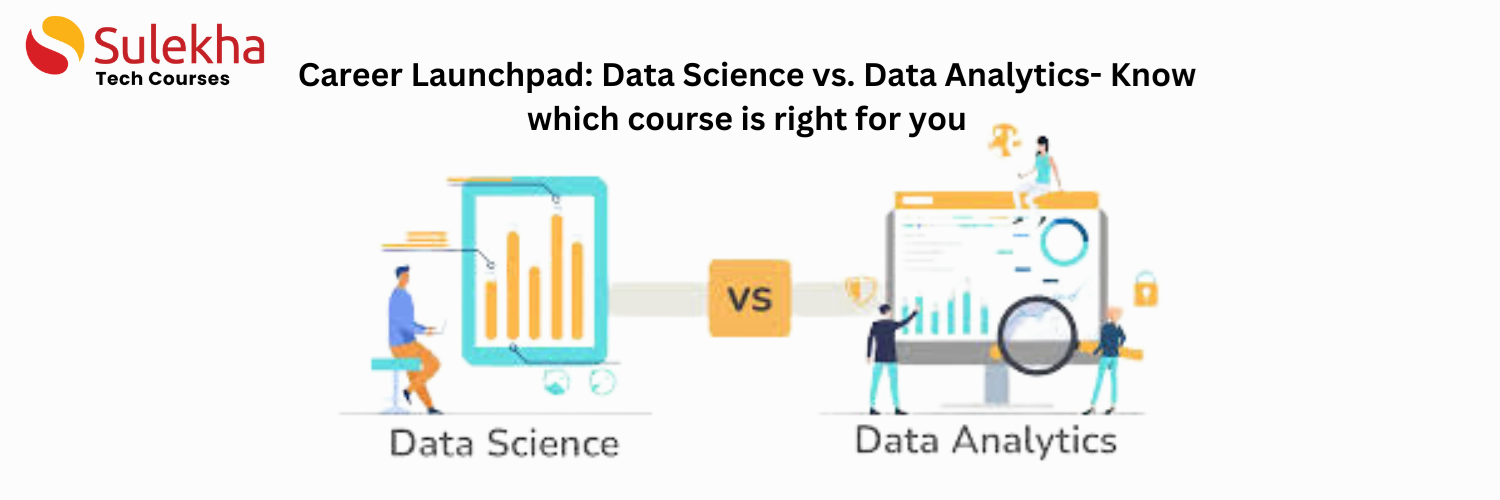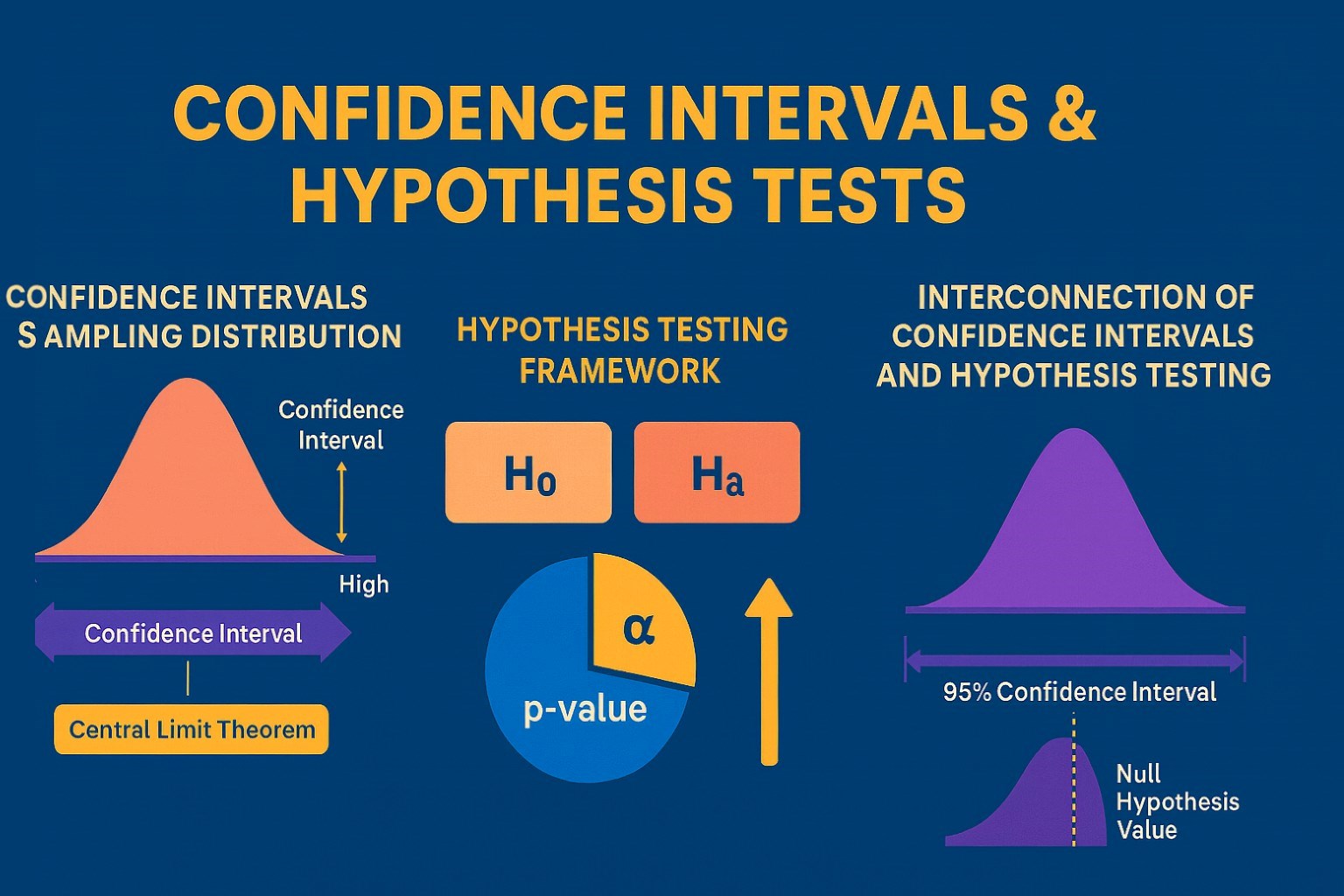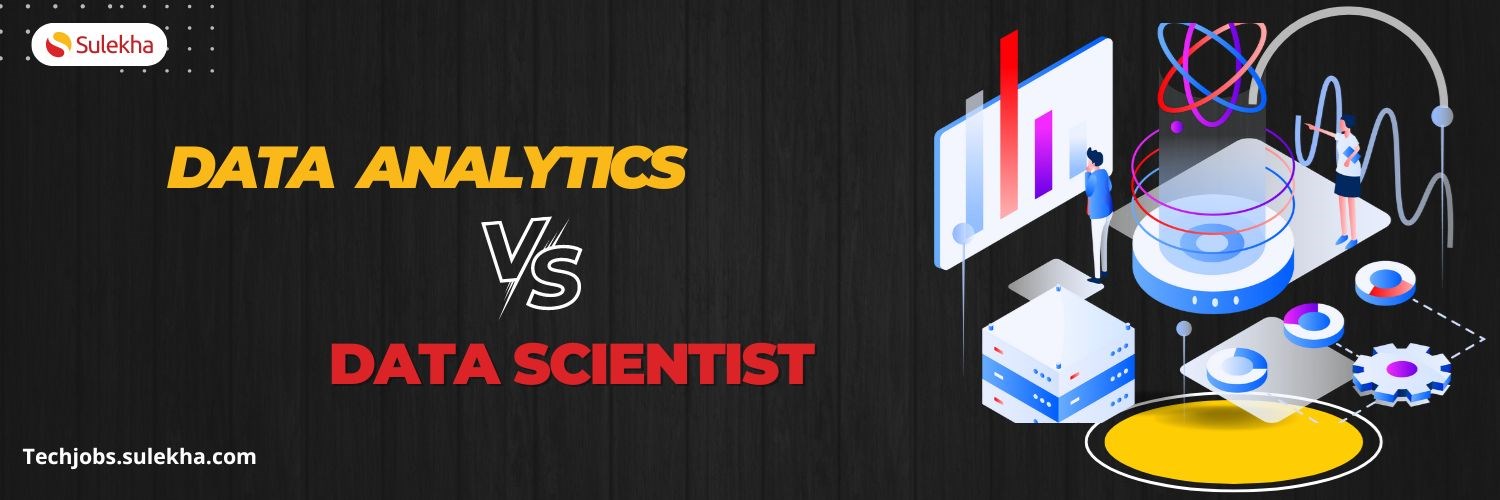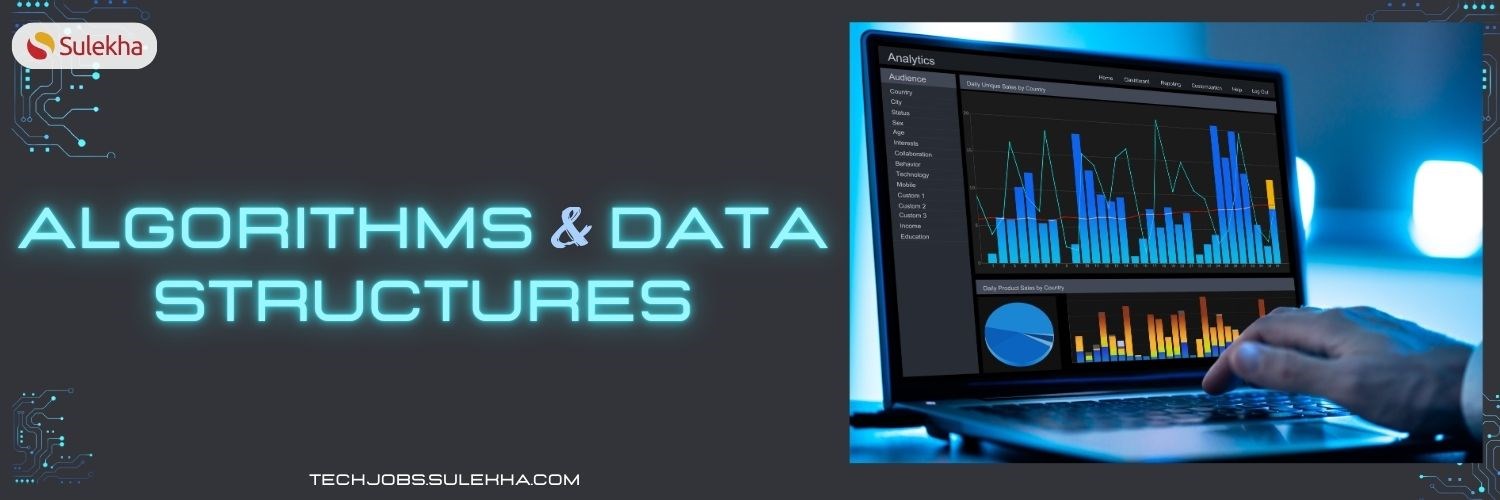Career Launchpad: Data Science vs. Data Analytics- Know which course is right for you

Career Launchpad: Data Science vs. Data Analytics- Know which course is right for you
Choosing the right career path can be overwhelming, especially in the dynamic world of technology. Data Science and Data Analytics are two popular fields with distinct career trajectories. This comparison will dissect the key differences, in-demand roles, curriculum, salary prospects, and future growth potential of these two data-driven domains. Let’s dive in!
Course Overview: Data Science vs. Data Analytics
Data Science is a multifaceted field that involves extracting insights and knowledge from structured and unstructured data. It combines statistical methods, machine learning algorithms, and domain expertise to solve complex problems. Data scientists often work on large datasets, building predictive models and uncovering hidden patterns.
Data Analytics focuses on interpreting and communicating data insights to inform business decisions. It involves collecting, cleaning, and analyzing data to identify trends and patterns. Data analysts collaborate closely with stakeholders to translate findings into actionable recommendations.
While both fields deal with data, data science delves deeper into complex modeling and prediction, while data analytics focuses on deriving insights for business applications.
In-Demand Roles: Data Science vs. Data Analytics
Data Science
Data Scientists are the modern-day detectives of the digital age. They delve deep into complex datasets to uncover hidden patterns and insights that drive business decisions. Key roles within Data Science include:
Machine Learning Engineer: Building and implementing machine learning models.
Data Engineer: Designing and building robust data infrastructure.
Data Scientist: Extracting actionable insights from data.
Statistician: Applying statistical methods to solve complex problems.
Data Analytics
Data Analysts are the storytellers of data. They transform raw data into meaningful narratives that inform business strategies. Key roles within Data Analytics include:
Business Analyst: Bridging the gap between data and business decisions.
Data Analyst: Extracting insights from data to improve business performance.
Market Research Analyst: Analyzing market trends and consumer behavior.
Financial Analyst: Using data to make financial forecasts and decisions.
Both fields offer exciting career paths with ample opportunities for growth and innovation. The choice between Data Science and Data Analytics ultimately depends on your interests and career goals.
Curriculum Breakdown: Data Science vs. Data Analytics
Data Science Curriculum
Data Science curriculums are typically more rigorous, focusing on advanced statistical techniques, machine learning algorithms, and programming proficiency. Core subjects include:
Statistics and Probability: Advanced statistical concepts and hypothesis testing.
Programming Languages: Python, R, and SQL for data manipulation and analysis.
Machine Learning: Building predictive models using algorithms like regression, classification, and clustering.
Data Mining: Extracting valuable patterns from large datasets.
Big Data Technologies: Handling and processing massive datasets using tools like Hadoop and Spark.
Data Visualization: Creating compelling visualizations to communicate insights effectively.
Data Analytics Curriculum
Data Analytics curriculums emphasize business acumen and data interpretation. While they cover statistical concepts, the focus is on applying data to solve business problems. Core subjects include:
Statistics and Data Analysis: Descriptive and inferential statistics for data interpretation.
Data Visualization: Creating impactful visuals to communicate insights to stakeholders.
Business Intelligence: Using tools and techniques to analyze business performance.
Data Modeling: Developing data models to support decision-making.
SQL and Database Management: Extracting and managing data from databases.
Data Cleaning and Preparation: Ensuring data accuracy and consistency for analysis.
Salary Outlook: Data Science vs. Data Analytics
Data Science Salary
Data Scientists are in high demand due to their ability to extract actionable insights from complex data. The role requires a strong foundation in statistics, programming, and machine learning. As a result, data scientists command higher salaries compared to data analysts.
United States: The average salary for a Data Scientist in the US ranges from $95,000 to $150,000 per year, according to [Source: Glassdoor, Salary.com, or Bureau of Labor Statistics].
Canada: Data Scientists in Canada can expect to earn an average salary between CAD $80,000 to CAD $130,000 per year, based on data from Salary.com.
Data Analytics Salary
While data analysts may not command the same salary levels as data scientists, the role is still well-compensated due to the critical nature of their work in driving business decisions.
United States: The average salary for a Data Analyst in the US falls within the range of $65,000 to $100,000 per year, according to Salary.com.
Canada: Data Analysts in Canada can expect to earn an average salary between CAD $55,000 to CAD $90,000 per year, based on data from Salary.com.
Future Prospects: Data Science vs. Data Analytics
Data Science
The future of data science is incredibly bright, fueled by the exponential growth of data and advancements in technology. Key trends shaping the field include:
AI and Machine Learning Integration: Data scientists will increasingly leverage AI and ML to automate tasks, build intelligent systems, and uncover deeper insights.
Big Data and Cloud Computing: The ability to handle and process vast datasets will be crucial, with cloud-based platforms becoming the norm.
Domain Expertise: Data scientists with specialized knowledge in fields like healthcare, finance, or marketing will be highly sought after.
Ethical Considerations: Understanding the ethical implications of data usage and ensuring data privacy will be essential.
Data Analytics
Data analytics will continue to be in high demand as businesses strive to make data-driven decisions. Key trends shaping the future of data analytics include:
Advanced Visualization: Creating interactive and immersive data visualizations to communicate insights effectively.
Prescriptive Analytics: Moving beyond predictive analytics to recommend optimal actions.
Data Storytelling: Transforming data into compelling narratives that drive business impact.
Augmented Analytics: Leveraging AI to automate data preparation and analysis tasks.
Both data science and data analytics are poised for significant growth in the coming years. As organizations increasingly rely on data to drive innovation and competitiveness, professionals with these skills will be in high demand.
Ready to launch your data-driven career? Explore top-rated Data Science and Data Analytics courses on Sulekha IT Services. Find the perfect program to match your goals and unlock your full potential. Visit Sulekha IT Services today and find the list of best institutes offering trending courses in and around your city!
Find a course provider to learn Data Science
Java training | J2EE training | J2EE Jboss training | Apache JMeter trainingTake the next step towards your professional goals in Data Science
Don't hesitate to talk with our course advisor right now
Receive a call
Contact NowMake a call
+1-732-338-7323Take our FREE Skill Assessment Test to discover your strengths and earn a certificate upon completion.
Enroll for the next batch
Data Science-Python-ML-AI-Deep Learning (Hands-on Training)
- Jan 28 2026
- Online
Data Science-Python-ML-AI-Deep Learning (Hands-on Training)
- Jan 29 2026
- Online
Data Science-Python-ML-AI-Deep Learning (Hands-on Training)
- Jan 30 2026
- Online
Related blogs on Data Science to learn more

Data Science in 2026: The Hottest Skill of the Decade (And How Sulekha IT Services Helps You Master It!)
Data Science: The Career that’s everywhere—and Nowhere Near Slowing Down "From Netflix recommendations to self-driving cars, data science is the secret sauce behind the tech you use every day. And here’s the kicker: The U.S. alone will have 11.5 mill

Confidence Intervals & Hypothesis Tests: The Data Science Path to Generalization
Learn how confidence intervals and hypothesis tests turn sample data into reliable population insights in data science. Understand CLT, p-values, and significance to generalize results, quantify uncertainty, and make evidence-based decisions.

Why Pursue Data Science Training?
Empower your career in a data-driven world. Learn why data science training is crucial for high-demand jobs, informed decisions, and staying ahead with essential skills.

Overview of data analytics VS data scientist
"Discover the key differences between data analytics and data science, explore top courses, job roles, salary expectations, and essential tools to build a successful career in these fields."

What are Algorithms?
Discover the fundamentals of algorithms and data structures, their characteristics, types, and their crucial role in problem-solving and programming efficiency.

TEN ENTRY LEVEL JOBS IN IT FOR FRESHERS
Explore ten entry-level IT jobs for freshers, including roles like Help Desk Technician and Cloud Engineer, that require no prior experience but foundational IT knowledge. Discover exciting career paths in the technology sector that offer growth and

What is statistics?
Discover the basics of statistics, including its major types—descriptive and inferential—and their importance in data analysis and prediction.

Twelve High Paying Jobs in New York City
Uncover twelve high-paying jobs in New York City, including roles like data scientist and public relations manager. Learn about their responsibilities and salary ranges.

What is Linear Algebra?
Discover the importance of linear algebra in various fields like data science, economics, and medicine. Understand its applications and why it's an essential skill for students and professionals alike.

TEN ENTRY LEVEL JOBS IN IT FOR FRESHERS
Discover ten entry-level IT jobs perfect for freshers, offering exciting career opportunities and a pathway to success in the tech industry.
Latest blogs on technology to explore

Drug Safety & Pharmacovigilance: Your 2026 Career Passport to a Booming Healthcare Industry!
Why This Course Is the Hottest Ticket for Science Grads & Healthcare Pros (No Lab Coat Required!)" The Exploding Demand for Drug Safety Experts "Did you know? The global pharmacovigilance market is set to hit $12.5B by 2026 (Grand View Research, 202

Launch Your Tech Career: Why Mastering AWS Foundation is Your Golden Ticket in 2026
There’s one skill that can open all those doors — Amazon Web Services (AWS) Foundation

Data Science in 2026: The Hottest Skill of the Decade (And How Sulekha IT Services Helps You Master It!)
Data Science: The Career that’s everywhere—and Nowhere Near Slowing Down "From Netflix recommendations to self-driving cars, data science is the secret sauce behind the tech you use every day. And here’s the kicker: The U.S. alone will have 11.5 mill

Salesforce Admin in 2026: The Career Goldmine You Didn’t Know You Needed (And How to Break In!)
The Salesforce Boom: Why Admins Are in Crazy Demand "Did you know? Salesforce is the 1 CRM platform worldwide, used by 150,000+ companies—including giants like Amazon, Coca-Cola, and Spotify (Salesforce, 2025). And here’s the kicker: Every single one

Python Power: Why 2026 Belongs to Coders Who Think in Python
If the past decade was about learning to code, the next one is about coding smarter. And in 2026, the smartest move for any IT enthusiast is learning Python — the language that powers AI models, automates the web, and drives data decisions across ind

The Tableau Revolution of 2025
"In a world drowning in data, companies aren’t just looking for analysts—they’re hunting for storytellers who can turn numbers into decisions. Enter Tableau, the #1 data visualization tool used by 86% of Fortune 500 companies (Tableau, 2024). Whether

From Student to AI Pro: What Does Prompt Engineering Entail and How Do You Start?
Explore the growing field of prompt engineering, a vital skill for AI enthusiasts. Learn how to craft optimized prompts for tools like ChatGPT and Gemini, and discover the career opportunities and skills needed to succeed in this fast-evolving indust

How Security Classification Guides Strengthen Data Protection in Modern Cybersecurity
A Security Classification Guide (SCG) defines data protection standards, ensuring sensitive information is handled securely across all levels. By outlining confidentiality, access controls, and declassification procedures, SCGs strengthen cybersecuri

Artificial Intelligence – A Growing Field of Study for Modern Learners
Artificial Intelligence is becoming a top study choice due to high job demand and future scope. This blog explains key subjects, career opportunities, and a simple AI study roadmap to help beginners start learning and build a strong career in the AI

Java in 2026: Why This ‘Old’ Language Is Still Your Golden Ticket to a Tech Career (And Where to Learn It!
Think Java is old news? Think again! 90% of Fortune 500 companies (yes, including Google, Amazon, and Netflix) run on Java (Oracle, 2025). From Android apps to banking systems, Java is the backbone of tech—and Sulekha IT Services is your fast track t